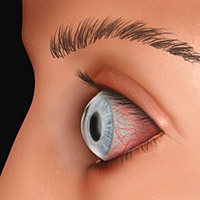 I. Chữa Mẹo
I. Chữa MẹoMột BS chuyên [nhãn] khoa cho biết cách tiện lợi giúp những vị bị khô mắt/mỏi mắt hãy làm như sau:
[1] Mỗi ngày ba lần, mỗi lần chín lượt nhắm chặt hai mắt sao cho hai mi mắt khép kín.
[2] Làm đều đặn như vậy một thời gian, tùy tạng phủ, cơ thể mỗi người, tuyến nước mắt được kích thích sẽ hoạt động tốt trở lại
I. Dry Eye Syndrome Treatment


Self-Care at Home
To help alleviate your symptoms from dry eye syndrome (DES), you may want to try these self-help tips at home.
- A humidifier puts more moisture in the air. With more moisture in the air, your tears evaporate more slowly, keeping your eyes more comfortable. Both furnaces in the winter and air conditioning in the summer decrease the humidity in the air.
- Excessive air movement dries out your eyes. Avoid excessive air movement by decreasing the speed of ceiling fans and/or oscillating fans.
- Warm compresses and eyelid scrubs with baby shampoo help by providing a thicker, more stable lipid layer. This is especially helpful if you have inflammation of your eyelids or problems with the glands in your eyelid that make the lubricant, sebum. The heat warms up the oil in the glands, making it flow more easily; the massaging action helps draw the oil out of the glands. The cleansing action decreases the number of bacteria that break down the oil.
- Artificial tears and lubricating eyedrops and gels (available over the counter) help provide more moisture and lubrication for the surface of your eye. They are typically used about four times a day, but they can be used as often as needed. Preservative free solutions are recommended if you wish to use tears more than six times a day.
- Lubricating eye ointments are much thicker than eyedrops and gels. Because ointments are so thick, they last much longer than eyedrops and gels. However, because of their thickness, ointments may blur your vision if used during the day. Therefore, they are typically used to lubricate the eyes overnight while you are asleep.
- If you notice your eyes are dry mainly while you are reading or watching TV, taking frequent breaks to allow your eyes to rest and become moist may be helpful.
Medical Treatment
Although no cure exists for DES, many treatments are available. Treatment is dependent on the severity of DES; you may only require a humidifier or occasional eyedrops, or you may require surgery to help decrease DES.
Over-the-counter lubricating eyedrops, commonly referred to as artificial tears, may help relieve your dry eyes. Some examples of these products include 20/20 Tears, Celluvisc, Comfort Tears, Dry Eyes, Murine, Refresh, and Tears Naturale. Your ophthalmologist may also prescribe medications to help increase your tear production.
CôngDungNgônHạnh









































